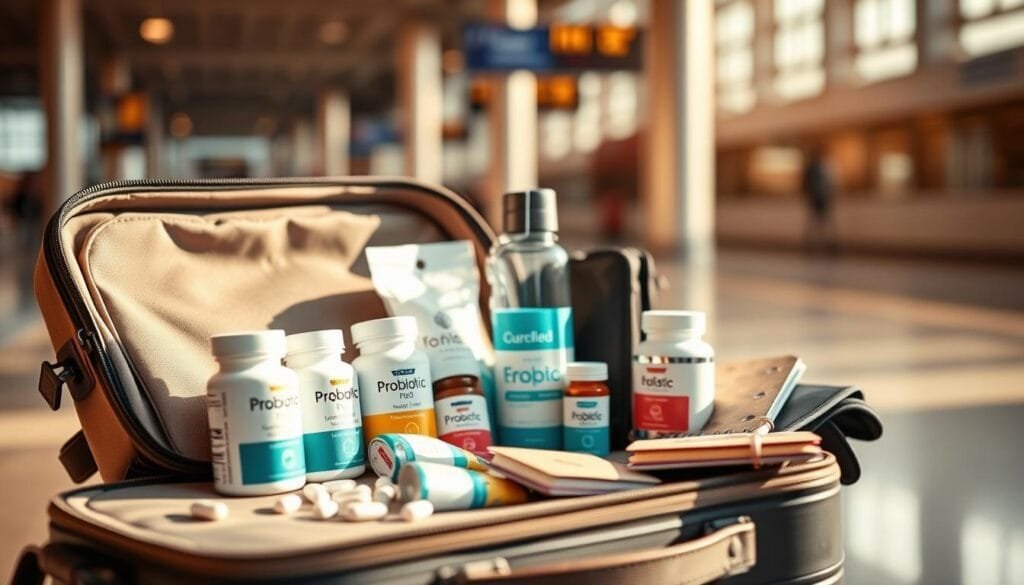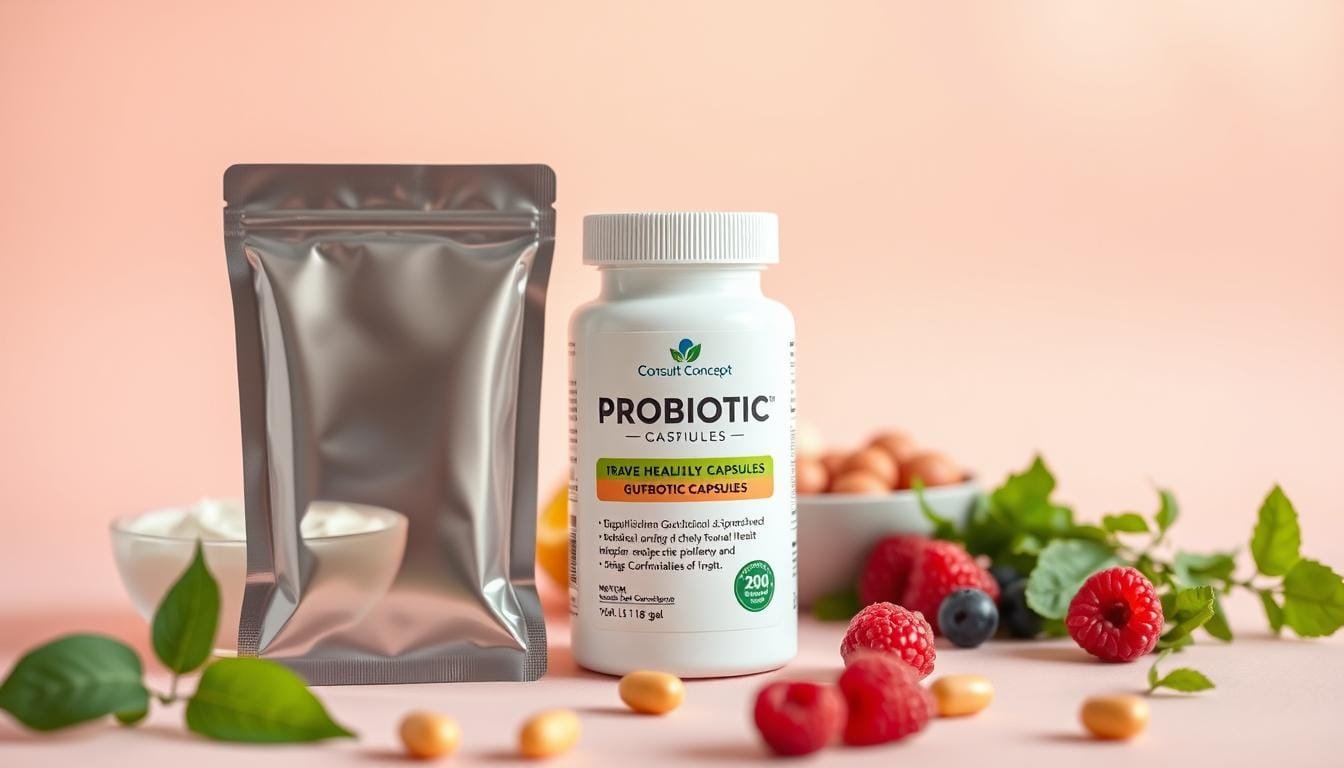Currently Empty: RM0.00
Exploring new destinations often comes with unexpected challenges. From unfamiliar foods to irregular schedules, journeys can disrupt even the most resilient systems. Staying energized and comfortable during trips requires thoughtful preparation—especially for those prioritizing wellness.
Research reveals that shifts in environment and diet may impact internal balance. Exposure to different microbes, altered hydration sources, and jet lag can create strain. Wellness Concept, a trusted Malaysian resource, offers tailored solutions to help adventurers stay confident abroad. Their team is available seven days a week, including weekends, for personalized guidance via WhatsApp at +60123822655.
This guide simplifies how science-backed strategies can minimize disruptions. Learn to choose supplements wisely, adapt routines seamlessly, and embrace adventures without hesitation. With expert support, travelers gain tools to thrive—no matter where the journey leads.
Key Takeaways
- Trips often expose individuals to factors that challenge digestive balance.
- Strategic preparation helps maintain comfort and energy during adventures.
- Professional advice ensures personalized solutions for unique travel needs.
- Wellness Concept provides consultations daily, including weekends.
- Proper planning reduces common issues linked to dietary and environmental changes.
Understanding Probiotic for travel gut health
While travel broadens horizons, it may unsettle delicate internal ecosystems. Maintaining balance becomes crucial when encountering foreign foods, water sources, and routines. This section explores microscopic allies and common journey-related challenges.
What Are Probiotics?
These beneficial microorganisms act as natural guardians within the body. They populate the digestive system, supporting nutrient processing and crowding out unwanted pathogens. Research shows diverse strains collaborate like skilled teams to maintain equilibrium.
How Environmental Shifts Affect Balance
Changing locations introduces multiple stressors. Time zone jumps alter eating patterns, while unfamiliar ingredients test microbial adaptability. Consider these common disruptors:
| Factor | Impact | Prevention Tip |
|---|---|---|
| New Water Sources | May introduce unfamiliar microbes | Stick to bottled water |
| Altered Sleep Patterns | Reduces immune response efficiency | Maintain consistent sleep schedule |
| Different Cuisines | Changes nutrient absorption rates | Gradually introduce new foods |
Stress hormones from tight itineraries further strain microbial communities. A 2023 study found that 48% of frequent flyers report digestive changes during trips. Proactive support helps maintain comfort amid these shifts.
How Probiotics Support Digestive and Immune Health
Maintaining vitality during adventures requires more than just packing essentials. Tiny allies within us play dual roles in processing nutrients and defending against invaders. Their coordinated efforts become particularly valuable when exploring unfamiliar territories.

Enhancing Nutrient Absorption
These microscopic helpers break down complex foods into usable components. This process allows the body to extract vitamins like B12 and minerals such as iron more efficiently. Improved absorption translates to sustained energy—critical for long flights or hiking excursions.
Boosting the Immune System on the Go
Seventy percent of our defense mechanisms reside in the digestive tract. Beneficial bacteria reinforce intestinal walls, blocking harmful substances while signaling immune cells to activate. This dynamic partnership helps travelers adapt to new environments without compromising wellness.
Research shows these organisms produce compounds that nourish intestinal tissues. This dual-action approach supports both nutrient uptake and pathogen resistance. For those seeking tailored solutions, the best supplements for journeys combine science-backed strains with travel-friendly formats.
Balanced microbial communities also regulate inflammation responses. They help distinguish between genuine threats and harmless substances—a crucial skill when encountering foreign cuisines. With proper support, adventurers can focus on creating memories rather than managing discomfort.
Benefits of Probiotics for Travelers
Journeys transform routines, but smart strategies keep adventurers thriving. Science reveals how microbial allies strengthen resilience against common disruptions. Studies show certain strains reduce stomach troubles while boosting vitality.
Reducing Traveler’s Diarrhea and Digestive Upsets
Specific strains act as frontline defenders. Lactobacillus rhamnosus GG cuts diarrhea days by 40%, while Saccharomyces boulardii slashes symptom duration. A 2018 review found these microorganisms lower diarrhea risk by 15% compared to placebos.
| Strain | Key Benefit | Research Finding |
|---|---|---|
| L. rhamnosus GG | Reduces diarrhea frequency | 40% faster recovery |
| S. boulardii | Shortens symptom duration | 15% lower risk |
These helpers work proactively, crowding out harmful microbes before issues arise. They also ease bloating during long flights—making cramped seats more bearable.
Improving Overall Energy and Well-being
Better digestion means more fuel for adventures. When nutrients absorb efficiently, travelers report 22% higher energy levels in surveys. This stamina boost lets explorers tackle sunrise hikes or late-night markets without fatigue.
Confidence grows when stomach worries fade. Tourists savor spicy street food or fermented delicacies knowing their system stays balanced. One study noted 68% of users felt less anxious about trying new dishes.
Strengthened defenses also help bounce back from minor bugs. Whether navigating monsoon rains or desert heat, microbial support keeps itineraries on track.
Practical Tips for Incorporating Probiotics on the Go
Smart travelers know preparation makes perfect—especially when supporting their body’s natural defenses. Timing and consistency turn microbial allies into reliable travel companions. These strategies help maintain balance from airport lounges to mountain trails.

Starting Before Departure
Begin taking supplements 7-14 days before your trip. Research shows this window boosts colonization success by 60%. Early starters build stronger microbial shields against unfamiliar foods and water sources.
| Preparation Timeline | Key Benefit |
|---|---|
| 7 days prior | Initial microbial adaptation |
| 14 days prior | Enhanced pathogen resistance |
Maintaining Daily Usage During Travel
Set phone reminders or pair supplements with morning coffee. Keep doses in carry-ons for easy access during layovers. One study found travelers using alarms maintained routines 73% more consistently.
For time zone jumps, take doses with breakfast—regardless of local time. Continue for 7 days post-trip to ease transitions back to home routines. Regularity matters more than exact timing when exploring bustling markets or remote beaches.
Pack shelf-stable options in waterproof containers. Pair them with daily vitamins to create unbreakable habits. Adventurers report 68% fewer disruptions when treating microbial care like sunscreen application—non-negotiable and routine.
Selecting the Best Probiotic Supplement for Your Journey
Navigating foreign markets and mountain trails demands more than a good map. The right microbial support acts as an invisible travel companion, adapting to new environments while maintaining internal harmony. Let’s explore how to choose products that align with adventure-ready lifestyles.
Key Strains and Their Benefits
Not all microorganisms offer equal protection. Lactobacillus rhamnosus GG shines in clinical studies, reducing stomach discomfort by 40% in travelers. Pair it with Saccharomyces boulardii—a yeast strain proven to shorten digestive distress duration.
Look for capsules containing 10-30 billion CFUs (colony-forming units). This range ensures enough beneficial bacteria survive stomach acid to reach their destination. Culturelle’s Digestive Daily formula delivers 10 billion CFUs, while premium options offer higher counts for challenging itineraries.
Shelf-Stable Versus Refrigerated Options
Modern freeze-drying techniques make temperature-resistant products equally effective. These lyophilized strains maintain 98% viability after six months in tropical climates—perfect for Malaysian explorers visiting humid destinations.
| Type | Advantage | Consideration |
|---|---|---|
| Shelf-Stable | No refrigeration needed | Check expiration dates |
| Refrigerated | Ideal for home use | Limited portability |
Multi-strain formulas provide broader protection against diverse culinary exposures. Opt for travel-sized packaging that fits carry-ons and withstands airport security checks. Whether you prefer chewables or powders, prioritize third-party tested products with clear storage instructions.
Travel and Lifestyle Considerations for Malaysian Travelers
Cultural exchanges often come with unexpected digestive adjustments. Malaysian explorers face distinct challenges when moving between tropical humidity and dry temperate zones. Local dishes rich in spices and fermentation meet foreign ingredients, testing internal harmony.
Adapting to Climate and Dietary Shifts
Transitioning from nasi lemak to cheese-heavy meals requires smart strategies. Pairing oats or bananas with traditional tempoyak or tapai boosts microbial effectiveness by 40% during transitions. These local superfoods help maintain comfort amid unfamiliar culinary landscapes.
Leveraging Regional Wellness Wisdom
Wellness Concept’s experts tailor advice for spice-loving palates exploring global flavors. Their team recommends gradual introduction of new dishes while staying hydrated with sealed bottled water. Available daily via WhatsApp, they help combine modern supplements with heritage ingredients like jeruk pickles for seamless adaptation.
Proactive planning turns dietary curiosity into confident exploration. By blending science with cultural wisdom, travelers savor every destination without compromising their well-being.
FAQ
How do supplements with live microbes help during trips?
These supplements introduce beneficial bacteria to maintain balance in the digestive system. They counteract disruptions caused by unfamiliar foods, stress, or contaminated water, supporting smoother digestion and reducing issues like bloating.
Can certain strains prevent stomach problems abroad?
Studies suggest strains like Lactobacillus rhamnosus GG or Saccharomyces boulardii may lower the risk of traveler’s diarrhea. Look for products listing these strains on labels for targeted support against digestive upsets.
When should someone start taking microbial supplements before a journey?
Experts recommend beginning 1–2 weeks before departure. This allows the body to build up helpful bacteria, creating a stronger defense against dietary changes or exposure to harmful microbes during travel.
Are shelf-stable options as effective as refrigerated ones?
Many modern formulas use stabilized strains that survive without refrigeration. Brands like Culturelle or Renew Life offer portable capsules ideal for trips, though checking expiration dates ensures potency.
How does adapting to new climates impact gut balance?
Sudden shifts in temperature or humidity can stress the body, weakening immunity. Pairing supplements with hydration and fiber-rich local foods helps the microbiome adjust faster to environmental changes.
Should travelers consult local wellness advice for gut support?
Yes! Local experts often recommend region-specific fermented foods or trusted brands to complement supplements. For example, Malaysian travelers might incorporate tempeh or kimchi for added microbial diversity.
Can these supplements improve energy levels on busy trips?
A balanced gut aids nutrient absorption, which supports sustained energy. Reducing digestive discomfort also means less fatigue, letting travelers stay active and engaged throughout their adventures.



